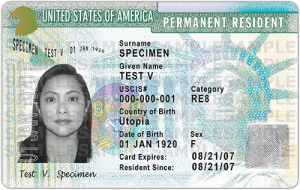Despite clarifications by government agencies that Green Card holders are good to travel, many Filipino immigrants currently in the United States or those visiting the Philippines are still confused by the conflicting information they are getting, unsure of what to expect upon their return to US ports of entry. The two Filipino cases below are illustrative of the concerns of many Green Card holders.
The first is from 73-year-old “Jose” who plans to visit his relatives in the Philippines:
I am a green card holder and my card will expire on February 21, 2017. I already filed for naturalization on May 5, 2016 and had my biometrics taken in June 2016. My problem is that I do not have an interview notice yet and I will not have a valid proof of status after February 21, 2017. I want to go the Philippines for a vacation to visit my family, but I am afraid that immigration officials will take me into custody after my return. What should I do?
Another email was received from “Rose,” asking if Green Card holders would encounter problems returning to the United States, she writes: My father-in-law is a Green Card holder and he left for Manila six months ago and he is returning home to US next month. Will he encounter any problem when he re-enters the US? Please advice.
In the first case of Jose, it will be best for him to obtain his naturalization certificate and get a US passport. Unlike during pre-election time when processing of naturalization was only taking around 3-5 months, the processing for naturalization is now taking an average of 8-9 months (or longer). Since Jose filed his naturalization application in May 2016, he should be expecting his interview notice soon. The fear of traveling and being taken into custody is brought about by recent misinformation. If he wishes to travel without waiting to be naturalized, he should first file for an extension of his Green Card and obtain a new one with a new validity date. It will indeed be difficult these days to travel without proper documents indicating legal status.
In the second case, Rose’s father-in-law, he should be returning to the United States without fear of encountering immigration problems since the Philippines was NEVER a designated country in the Trump Executive Order.
Possessing a Green Card during one’s travel to the United States is generally proof of legal status. But since permanent residents are still non-U.S. citizens, they are still vulnerable to restrictive immigration policies. A number of relevant provisions of US immigration laws may still subject a Green Card holder to ground of inadmissibility; or, removability in cases where there is a history of removable offenses; or, if there was prior fraud or misrepresentation in obtaining the resident status.
A familiar scenario for many elderly Green Card holders is the possible abandonment of resident status. This applies to Green Card holders who live abroad for lengthy periods of time and spend only short, periodic visits to the United States. These Green Card holders must file re-entry permits before departing the United States. Otherwise, they risk a finding of abandonment of their Green Card resident status. If a CBP (Customs and Border Protection) officer finds out that there is a lengthy stay abroad, he may require the Green Card holder to accomplish an abandonment of status form before they are allowed in. This form must never be signed without consulting with an attorney.
With the fast issuance of Executive Orders, haphazard implementation of these orders, ever-changing interpretations of these orders, as well as the spread of fake news, it is now more important than ever to know one’s legal rights and get accurate information from reliable sources.
(Atty. Lourdes S. Tancinco is a San Francisco CA based immigration attorney and may be reached at law@tancinco.com, www.tancinco.com , facebook/tancincolaw, or at 1 888 930 0808 or at 1 415 397 0808)


